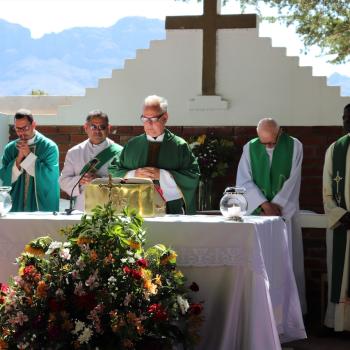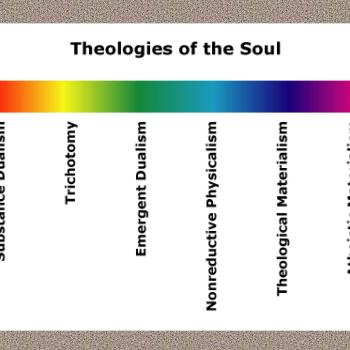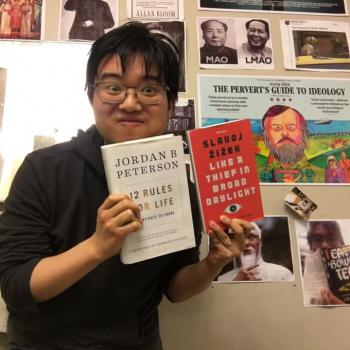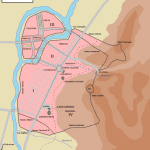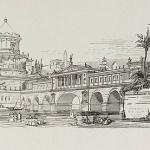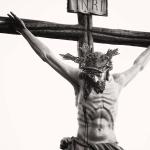
The image is released free of copyrights under Creative Commons CC0.
This is the second in a series of posts testifying about my conversion to liberation theology. The first can be found here.
I was an Anglican in graduate school. Someday, I will tell the true story of how I became an Anglican, but not today. However, it can be said that it worked to my academic advantage for most of the time I was hanging out in the Anglican Communion, from my final year in my undergraduate studies to the end of my postdoctoral fellowship. In fact, it bears reflecting how at each point in my academic training, those who mentored me closely were Anglicans: a China scholar in the liberal wing of the Anglican Church of Canada in my undergraduate studies, an urban geographer whose evangelicalism made him a key player in the global Anglican realignment, the founder of the comparative religion program where I did my postdoctoral work whose Episcopalianism was laced with a strong appreciation for Orthodox Christianity. Part of the advantage of being so Anglican throughout my higher education might have had to do with how Anglicans, especially those in Canada, are generally known to be more ‘progressive’ than Catholics and Orthodox on a number of social issues. But as many of my readers know, I came to Anglicanism through the global realignment ostensibly about sexuality issues (though they might not have known about the academic mentor whose church life was also in that world), so the progressivism also generally did not apply to me.
My Anglican persona was in full swing by the time I began as a doctoral student in geography. That academic mentor of mine – which I must remind you is a geographer, not a theologian (I do not have a single academic degree in theology) – who was also Anglican (but of, once again, the mostly evangelical variety) took me under his wing and told me to read another Anglican (but of the mostly Anglo-Catholic variety), the theologian John Milbank. ‘Theology and Social Theory is a book that is almost inaccessible, and I wish he had been more clear in the writing of it, because it might reached more people,’ he told me, ‘but it is extraordinary in its scope.
It was, on both counts. I found Theology and Social Theory nearly incomprehensible. It was also extraordinary in its scope. Milbank began with a critique of liberal political science and economy. He then moved on to show that sociology as a discipline was deeply theological in its way of ‘policing the sublime’ from entering into the explanation of secular phenomena, including a cast of characters ranging from Durkheim to Weber to Parsons. Next, he showed that Hegelian and Marxist dialectics were mutations of Christian theology and accused liberation theology of a kind of ‘policing of the sublime’ by positing that the supernatural could be ‘naturalized’ – that the things of God were just a part of a ‘natural theology’ that didn’t have divine cause. He contrasted that with some of the theologians I had learned to love for their work on the supernatural: Henri de Lubac, Hans Urs von Balthasar, Maurice Blondel. In a rousing finish, Milbank even took on the nihilism of post-Nietzschean philosophy and hammered Foucault and Deleuze. In that effort, he mostly used the work of René Girard in positing that there is a kind of ‘ontological violence’ that is assumed by a pagan world, but that the Church is the bearer of a truer ontology, one undergirded by ‘harmonious communion.’
We also read Charles Taylor’s Secular Age – a point that I’ll get back to by the end of this series, God willing – but of Taylor and Milbank, I must admit that I liked Milbank more. It helped, for example, that he cited the same Catholic theologians who taught me so much about le surnaturel, the continuing presence of God in the world he created to be infused with his grace. I also liked his joke about how his rejection of liberation theology as ‘naturalizing the supernatural’ made him sound like ‘certain Vatican reactionaries,’ by which he almost most certainly was referring to the 1984 ‘Instruction on certain aspects of the ‘theology of liberation‘ (which I hope to work somewhat through in a future post in this series). Of course, he got away with it in my books because he opposed Thatcherite neoliberalism with what he called ‘Christian socialism,’ which hardly sounded like a rejection of a theology that liberates. But the thing that hit me the most was his emphasis on the Church as a society held together by an alternate ontology of harmonious communion, a point that I also found salient in my reading of Stanley Hauerwas, especially in his critique of American theologians and philosophers of religion like William James and Reinhold Niebuhr and his promotion of theologians like John Howard Yoder and Karl Barth. Like Milbank, Hauerwas had taken it out on the American church for having sold out to the world, ‘naturalizing the supernatural,’ and argued that his job as a theologian was to make ‘the church the “church” and the world “the world.”‘
Now this, if you must know, is what Anglican theology is really about. There is a joke that there is no such thing as Anglican theology because it is basically everything and anything. In fact, it can be said that in terms of the episcopal food chain, Anglicans definitely have apostolic succession; it’s just that the apostolic teaching that’s supposed to come with it sometimes seems to be optional. No wonder Sir Humphrey in Yes, Prime Minister describes the Church of England as ‘primarily a social organization’ in which God is ‘what they might call an optional extra.’
But at its best – and here, Milbank and Hauerwas (and Sam Wells) speak as Anglican theologians (whatever Hauerwas’s United Methodist origins might be) – Anglican theology is about life in a unit called a parish. A parish is a geographical designation that is centered on a physical church location that is the gathering place for a worshipping community. The community comes together in prayer, but the scandal of that community is that everyone and anyone is probably going there. What this means is that there are going to be many different viewpoints on the relationship between God and the world that are represented in a parish. The thing that everyone has to remember is that the church is based on an ontology of harmonious communion, not political violence. This means that it is often the case, as the Congregationalist minister Lillian Daniel also says, that you will be going to church with people you don’t like, but you have to pass them the peace anyway. Scale this out to the entire world, and this is what the Anglican Communion is really about: a global network of 39 autonomous churches held together by ‘bonds of affection’ that are internally diverse and all differ from one another as well. It is, as Rowan Williams puts it in Anglican Identities in his gloss on Richard Hooker, a commonwealth, the notion that we are all in this together in a very real and material way whether we like it or not. Anglican theology is about how that commonwealth is held together, especially at the local parish level with an ontology of communion.
This vision of the church appealed to me at the time. I grew up in non-denominational Chinese evangelical churches, but all of my ministry experience has actually been in Anglican parishes (although these were basically evangelical too, as that’s what you get in Chinese Anglicanism in Vancouver, which is what I show in a forthcoming paper in Ching Feng). Although there were differences in liturgy, the evangelical/Anglican distinction was actually hard to make because, really, the same kinds of politics prevailed in those churches. Church politics is a euphemism, of course, for the mind games and soul-destroying political violence that go on in parishes, and usually they are instigated by people who think that a part of the church is going the wrong way and they have to preserve the faith as they know it, whether it is fidelity to something they see in the Bible or in an ethnic culture or what they’ve always been doing.
Before beginning my doctorate, I had been completely destroyed in ministry. To cut a long story short, the youth group that I started at an Anglican parish blew up in my face. In practical terms, this meant that I lost my church politics battle to a handful of teenage girls, which is embarrassing and defies explanation. Looking for something to make sense of my horrible experience in ministry, I went to academia to heal, which is a terrible idea for anyone who is considering it because that world is even more brutal than the church. But in trying to articulate a theory for my academic work, I stumbled on this theology, one circumscribed by Milbank, Hauerwas, Wells, and the whole gang of theologians we might call ‘post-liberal’ and ‘radical orthodoxy.’
As far as I could see, there is a particular vision of power in this theology, which is basically that if you are wielding it, you are probably doing it wrong. This, of course, does not mean that you can’t do parish politics. Instead, it means that you only do good politics. Good politics is where you maintain the parish – and by extension, the global church, and also your home and workplace and even civil society – as a community that exemplifies the kind of harmonious communion that Milbank is talking about. In this line of thought, difference is a good thing because it’s what creates the harmony, so you just have to make sure that what you have in the parish is not dissonance. Contestation of power is what creates that dissonance. But that can be harmonized, say, through the partaking of the Eucharist, where different people can all come together and maintain their differences while ingesting the same Lord and participating in the same liturgy.
This theological praxis had some implications for what I thought of liberation theology at the time. First, it was not as if there was not a ‘socialist’ streak to this vein of thinking. In the United Kingdom, the political platform that was generated from Radical Orthodoxy was called ‘Red Toryism,’ which has been used in the past to refer to lots of things, but what Phillip Blond meant was basically that small communities – parishes! – are places where local solutions based on deeply-held shared personal values to political and economic problems can emerge. This kind of thing, of course, led to an alliance of sorts between Radical Orthodoxy and the Conservative Party, but scale out to a broader-based understanding of Anglicanism, we see that this kind of parish politics does really have socialist implications, as articulated in William Temple’s Christianity and Social Order clear up to the identification of ‘urban priority areas’ that require the attention of the welfare state in the 1980s report to the Archbishop of Canterbury, Faith in the City. In fact, in the very contentious exchange between Eugene McCarraher and Milbank that I edited for Syndicate, Milbank goes as far as to insist that he is a working-class socialist with a commitment to local community life. In this way, there is the sense that there are structures in societies that maintain poverty and oppression, but the way to deal with them is strictly at the local level.
Second, at a personal level, there was the sense that it was by bringing together in the parish, true liberation could be generated. A favorite observation by many Anglicans, for example, is that there might be very rich people and very poor people in a parish, but when it comes time for the Eucharist, they are all kneeling in the same pew. This kind of story is an extension of sorts of the politics of harmonious communion – that at the end of the day, capital and ideology are relativized, because we are all just persons before the Lord. We don’t even have to like each other, and some of us might be oppressing other people out in the secular world, but we all need Jesus and are equal before him at the level of the soul. With such personal encounters, the making of a truly just society is said to be possible. In fact, in many ways, this is the point of some of the greatest English theologians of the last century up to the present: fantasy fiction writers like C.S. Lewis, Charles Williams, J.R.R. Tolkien, and even J.K. Rowling. The idea is that solidarity comes from serendipitous personal encounters and friendships that need to be nurtured for common life.
Third, what this means is that there is a kind of continuity from the church to the world. As much as Hauerwas and Milbank militate against the secularization of the Christian church, what they are also saying is that the parish is the bearer of a deeper ontology that is in fact true of the world. This is because a ‘secular’ theology is not only premised on an ‘ontology of violence,’ but is also therefore a false theological premise. The truth of the world, which the parish holds close to its heart, is that harmonious communion is what makes the earth go round, and Christian witness is to live out that truth in the other institutions and communities of the world even if they do not understand themselves to be structured this way. Personal action shapes the world, relativizing its structures of violence. The way forward is to bear witness to the world by living in it beautifully, practicing the good politics housed in the parish.
There are many things that are commendable about this view of the world. But as I’ll show tomorrow, I felt like there was something missing in it. Searching for that troubling absence, I hope to suggest then, led me down the rabbit trail to the very liberation theology that Milbank and the Congregation for the Doctrine of the Faith seem to reject, and it ultimately required me to give up Anglicanism and ‘Radical Orthodoxy’ for Orthodoxy-in-communion-with-Rome.




